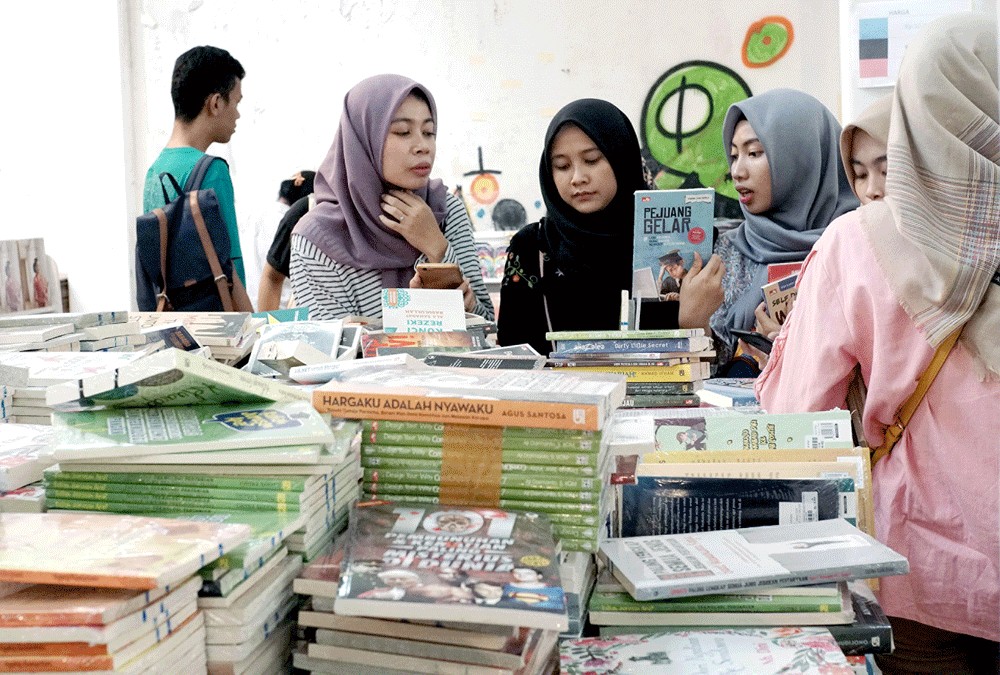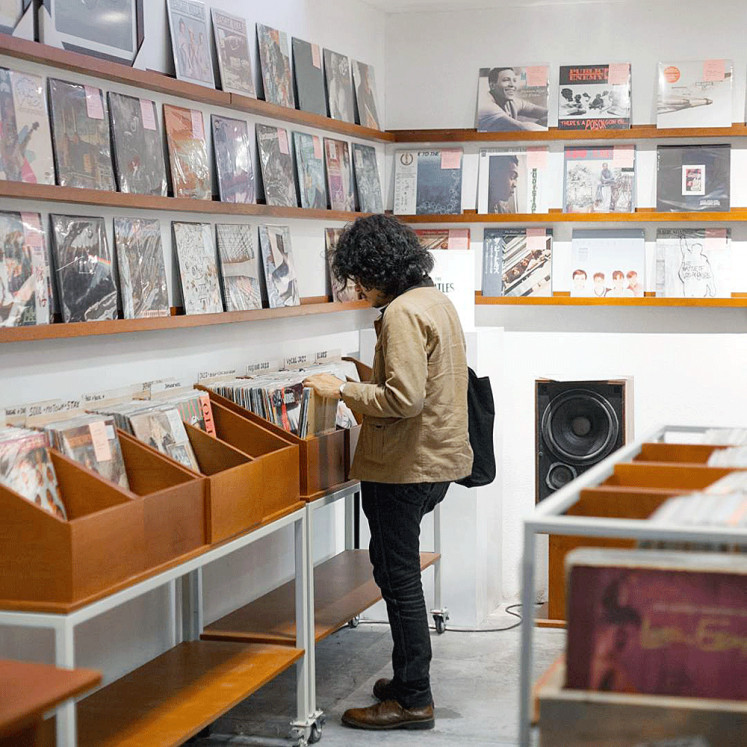Popular Reads
Top Results
Can't find what you're looking for?
View all search resultsPopular Reads
Top Results
Can't find what you're looking for?
View all search results2018 in review: The peaks and valleys of Indonesia's literary scene
Offline bookstores struggle to stay relevant in the digital era, while emerging writers are finding new platforms for seeing their works in print.
Change text size
Gift Premium Articles
to Anyone
W
ith more and more literary lovers in Jakarta expanding their repertoire by exploring new titles online, physical bookstores and publishers are finding new ways to engage the sophisticated readers of the digital generation.
Weakening sales continued at bookstores in 2018, with independent bookstore Aksara closing its branches at Pacific Place and Cilandak Town Square for financial reasons.
But Aksara viewed the setback as an opportunity to grow, launching a major makeover for its flagship store in Kemang, South Jakarta, and turning it into a gathering space for photography, film, music, coffee and visual arts communities.
Aside from still offering Indonesian- and English-language titles rarely found in mainstream bookstores, Aksara’s Kemang outlet now houses the Ruang Seduh coffee shop, Donut Kampung doughnut shop, La-La Records — which sells vinyl — the (lab)Rana analog photography studio, Ganara Art Space and the Kinosaurus cinema café.
Walking into the bookstore is to be transported into a communal atmosphere, with many people sitting down to engage in the various activities the new space offers.
“I would like to have everyone — including those who love music, photography and film — to discover the world of literature through their activities at Aksara,” creative director Adinda Simanjuntak told The Jakarta Post by phone.
Aksara also forged a partnership with POST bookshop, which curates titles for a dedicated section in the Aksara bookstore. The POST team also selects book club themes three times a year for readers to exchange recommendations on loved titles.
“[The POST co-founders] are so passionate about what they do with regard to books,” Adinda said. “I already knew they would make an equally passionate partner for us.”
Tunes and books: Independent bookstore Aksara invites various culinary and art-related stores to fill the space at its newly-renovated Kemang outlet. One of them is La-La Records, which sells a curated selection of vinyl records. (Courtesy of Aksara /-)Tucked away in Pasar Santa of South Jakarta, POST is a place where avid readers go to discover titles that offer fresh literary perspectives. Teddy W. Kusuma and his wife, Maesy Ang, are the brains behind the bookshop.
POST has built a strong base of loyal customers through offering Indonesian titles from non-mainstream publishers such as Mojok, Marjin Kiri and Banana, as well as modern Indonesian classics by Yayasan Obor.
The bookshop also presents a curated selection of English-language books and journals, such as novels by female African-American writer Ann Petry or the latest edition of Mekong Review, a Southeast Asian literary quarterly based in Cambodia.
“In selecting the titles, we emphasize the diversity of the writers’ perspectives, both in terms of gender and race,” said Maesy.
In an apparent move to embrace the digital era, POST has opened an email ordering service, with online purchases accounting for 30 percent of the bookshop’s annual revenue.
Platform for new talent
More Indonesian writers are getting a chance at publishing through several initiatives like Comma Books (c/b), which was established in 2017 as an imprint of the Kompas Gramedia Group’s Kepustakaan Populer Gramedia.
“Our division primarily focuses on works by emerging writers and artists,” said Comma Books founder and curator Rain Chudori, adding that the imprint emphasized diversity in genres, from novels to short stories and from travel literature to poetry.
Read also: Rain Chudori: Rattling cages with Comma Books
“We have a lot of readers from our generation, as Comma Books primarily consists of 20-something creatives,” the 24-year-old, who is a published author herself, explained in an email on Comma Books’ first anniversary celebration.
Comma Books partnered with the Ubud Writers & Readers Festival (UWRF) 2018 to publish the works of emerging writers for the festival, including Pratiwi Juliani’s short story collection, Atraksi Lumba-Lumba (A Circus of Dolphins).
Another short story collection, Raka Ibrahim’s Bagaimana Tuhan Menciptakan Cahaya (How God Invents Light) that Comma Books published, has received the National Book Committee’s Indonesian Literary Translation (LitRI) grant. Rain herself is the translator.
More and more Indonesian books have been translated in the last three years. The National Book Committee’s data shows that by October, foreign publishers had purchased the translation rights to 233 Indonesian titles, compared to 226 titles last year and 219 titles in 2016.
PT Gramedia Pustaka Utama (GPU), also of the Kompas Gramedia Group, has also published the English translations of Indonesian titles like Djenar Maesa Ayu’s 2005 novel, Nayla, and Ratih Kumala’s 2010 short story anthology, Larutan Senja (The Potion of Twilight) on its own initiative and dime, said GPU general manager Siti Gretiani.
Siti added that GPU had also published the Indonesian translations of two renowned Latin American writers — One Hundred Years of Solitude and Love in the Time of Cholera by Gabriel Garcia Marquez, as well as Cinco Esquinas (The Neighborhood) by Mario Vargas Llosa — due to increased interest among Indonesian readers in Latin American literature.
Literary luminaries shine brighter
It seems that the rising trend in translated Indonesian titles as well as the popularity of Latin American writers in the country can be attributed to Indonesian literary star Eka Kurniawan, who cited Latin American authors among his many literary influences.
Eka reached new heights this year when he received the Prince Claus Award 2018 for “his profoundly imaginative storytelling, the remarkable beauty of his prose and the universal relevance of his subject matter”.
He was also recognized for “confronting violent political acts that are absent from official discourse and examining controversial issues in a way that people can really relate to, helping them to reclaim stories of their past and construct a better understanding of their country”.
Meanwhile, the country’s international literary festivals are still going strong, including the Makassar International Writers Festival, the South Tangerang Literary Festival, the Borobudur Culture and Writers Festival and the UWRF.
This year, the UWRF gave its lifetime achievement award to Indonesian writer and poet Sapardi Djoko Damono.
At 78, the living literary legend remains productive and has gained newfound popularity, thanks to a growing base of younger readers. This year, Sapardi released his Perihal Gendis (About Gendis) poetry collection, while the reprint of Yang Fana Adalah Waktu (What is Everlasting is Time), the final novel of his Hujan Bulan Juni (Rain in June) trilogy, sold 9,000 copies.
This was also the year for Acehnese author Azhari Aiyub, whose novel Kura-kura Berjanggut (The Bearded Turtle) won the Prose category of the 18th Kusala Sastra Khatulistiwa literary award.
Poet and architect Avianti Armand received her second Kusala Sastra Khatulistiwa award in Poetry with Museum Masa Kecil (Childhood Museum), while Rio Johan came out on top in the First/Second Work category with Ibu Susu (Mother’s Milk), which he wrote during his 2016 residency with the National Book Committee.
Wordsmiths we lost this year
The Indonesian literary scene also mourned the tragic loss of two senior writers to traffic accidents: Danarto, at the age of 77, and NH Dini, 82.
Danarto was best known for his short story collections like Godlob ( 1975 ) and Adam Ma’rifat ( 1982 ), and was the 1988 recipient of the SEA Write Award.
NH Dini, one of the nation’s most celebrated writers, dared to break the patriarchal concept of women and wives through works like Pada Sebuah Kapal (On a Ship) and La Barka.
“We will reprint six of NH Dini’s works to honor her memory,” said GPU editor Mirna Yulistianti.
Disclaimer: The Jakarta Post’s Sebastian Partogi is the translator of Nayla by Djenar Maesa Ayu.












